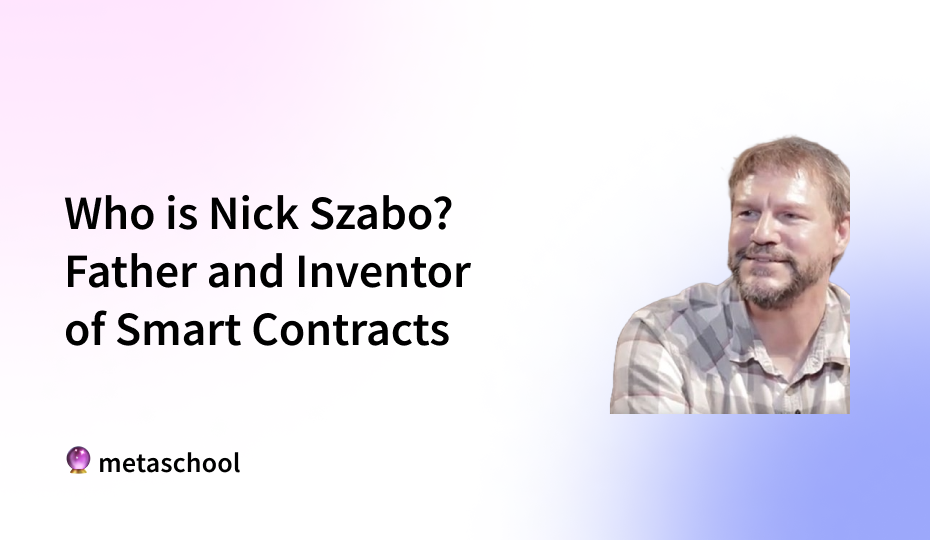Table of Contents
Nick Szabo is a computer scientist, legal scholar, and cryptographer who is known for his work on digital contracts and virtual currencies.
He is credited with coining the term “smart contracts” and is widely considered to be one of the leading experts on the subject, some even consider him as the Father of Smart Contracts. Szabo is also known for his pioneering work on digital currencies and decentralized systems, which laid the groundwork for the development of blockchain technology.
Background
He holds a Bachelor of Science degree in computer science from the University of Washington, a Master’s degree in the same field from George Washington University, and a Juris Doctor from the University of Southern California.
Szabo has also studied law, economics, and game theory, among other fields. He is an adjunct professor at the University of Cailfornia, Berkeley, lecturing on the legal aspects of cryptocurrency and digital contracts.
Contributions to blockchain
Nick Szabo proposed the concept of smart contracts in the mid-1990s is best known for it. In 1998, he published a paper titled “Smart Contracts: Building Blocks for Digital Free Markets,” which is credited as the first formal description of smart contracts. This paper introduced the concept of using blockchain technology to enforce contractual obligations. He described them as computerized transaction protocols that execute the terms of a contract. In essence, smart contracts are computer programs that can automatically execute the terms of a contract when certain conditions are met.
Smart contracts are built on a blockchain platform, which is a distributed ledger technology (DLT). This means that the contracts are stored and replicated across multiple computers in a network. As such, all the terms of the contract are held in a secure, decentralized environment. They can be used to automate a range of activities, such as payments, escrow, information exchange, and more. They can even be used to facilitate digital asset trading.
The advantage of using them is that they are secure and transparent. Both parties involved in the transaction can trust that the terms of the contract will be executed as written. Moreover, since the contracts are stored on a blockchain platform, they are immutable, meaning that they cannot be changed or tampered with.
Smart contracts are still in the early stages of development and there are many challenges to overcome before they become mainstream. However, the potential of the technology is undeniable and many believe that it will revolutionize the way we do business in the future
In the early 2000s, Szabo worked on designing an online currency called BitGold, which is seen as a predecessor to Bitcoin. Most digital currencies solve the Double Spending problem by giving some control to a central authority, which Szabo didn’t want to accept as a solution. Hence he was working on BitGold to solve the problem in a way that the decentralization of the cryptocurrencies is not compromised. Szabo created BitGold as a solution for shortcomings in the traditional financial systems of records. In the end, the project wasn’t completed.
He also developed a programming language called E-Lisp and wrote a book on cryptography and security titled “Secrets, Lies, and Digital Cash.”
Szabo is also a frequent speaker at technology and cryptography conferences and has written numerous articles on topics such as digital identity, digital currency, and smart contracts. He is a frequent contributor to The Economist and Forbes Magazine.
Is Nick Szabo the real Satoshi Nakamoto?
As the mystery about Bitcoin’s creator only deepens, there are speculations that he is the real Satoshi Nakamoto. In 2014 the Aston University Center for Forensic Linguistics conducted research on Bitcoin’s whitepaper in which it was determined that the linguistics of Szabo and Nakamoto are very similar. It was not just that but even the Bitcoin whitepaper was drafted using an open-source document known as ‘Latex’ which apparently Szabo also uses for his publications.
Elon Musk, too, has theories about it.
It seems as though Nick Szabo is probably, more than anyone else, responsible for the evolution of those ideas.
Despite all the speculation and theories, Nick Szabo has denied it on several events saying he has nothing to do with the character Satoshi Nakamoto, he added
All I’m saying is, there are all these parallels, and it looks funny to me, and looks funny to a lot of other people; (…) all this speculation is flattering, but wrong — I am not Satoshi.
Szabo is currently a partner at Blockstream, a Bitcoin and blockchain technology company. He also consults for various companies and projects in the blockchain space on digital contracts and virtual currencies. Szabo is an adviser to the Ethereum Foundation and serves on the board of the Bitcoin Foundation. He is also a founding member of the CryptoCurrency Security Standard (CCSS) project.
He also researches and writes, focusing on the intersection of technology, law, and economics which keeps his Twitter alive too with opinions surrounding blockchain, cryptocurrency and financial systems. He is a well-known figure in the blockchain community and is widely regarded as one of the leading experts on smart contracts and decentralized systems.
